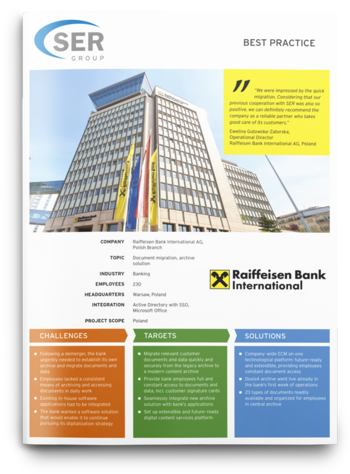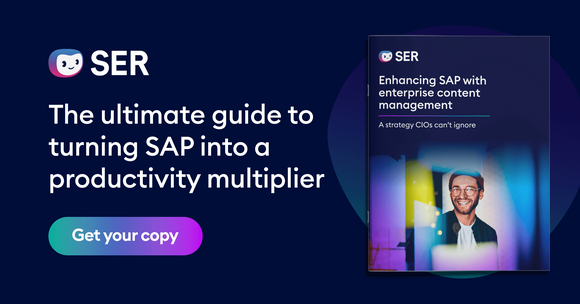SER Blog Innovation & Technology
Bringing DMS to the Cloud
The benefits of a cloud-based document management system
The cloud has been part of our personal lives for many years. We are accustomed to everything being at our fingertips and available at any time and in any place. Cloud-based apps are designed to exactly meet our requirements and make our lives easier. State-of-the-art cloud solutions are also becoming increasingly important for companies in the era of new work with flexible work models such as home office, hybrid work and work-life blending.
A cloud-based document management system (DMS) makes your business-related documents quickly accessible from anywhere, facilitates collaboration, and helps you to optimize your business processes.

Definition: On-premise vs. Software as a Service
You run on-premise software locally on your own server. You are responsible for installing and maintaining the hardware, you have to carry out updates, and ensure data is protected.
When you choose a Software as a Service (SaaS) solution, such as a Cloud DMS or Cloud ECM (Enterprise Content Management System), your data is stored on external servers. You outsource the IT infrastructure and lease the application, which the SaaS provider* operates, maintains and updates via the cloud. To use the software, you usually buy a subscription and can then access the system via the internet.
Software in the cloud: Benefits at a glance
1. Scalability
Cloud DMS solutions enable companies to flexibly adapt their storage and processing capacities. You can easily add more storage space or user licenses as your document volume grows – without expensive and time-consuming hardware upgrades.
2. Cost efficiency
By using a Cloud DMS, you save high purchase costs, as well as setting up and maintaining servers and other infrastructure components. Instead, a SaaS solution brings with it lower, regular and predictable costs. In a long-term comparison, cloud solutions often fare better because the associated costs, such as personnel, training or recruiting costs, are also reduced.
3. Global accessibility
As a cloud solution, the DMS is always accessible via the internet. The files and information needed are available immediately. This means your employees can always work productively, no matter where they are.
Cloud DMS systems promote collaboration and flexibility, particularly for companies with distributed teams or remote working models. Collaboration with third-party service providers and partners is also easier via the cloud.
4. Data integrity and security
Reputable DMS providers set great importance on the security of their platforms. To comply with data protection regulations, they implement, for example, advanced encryption methods and provide access control tools to prevent unauthorized access.
With software as a service, you also benefit from the high security standards of the leading cloud providers. Thanks to regular backups, redundant data storage and server clusters, the risk of data loss can be minimized. The server operators take many precautions to ensure high data integrity and availability. You would have to take care of that yourself with an on-premise solution.
Info: To ensure that the cloud DMS provider of your choice offers a high level of information security check for ISO 27001 certification.
5. Integration and collaboration
Cloud DMS systems can often be integrated seamlessly with other business applications, such as cloud-based CRM and ERP systems, project management tools, or email clients. This allows employees to access and edit documents directly from other applications, which increases productivity and ensures smooth collaboration.
6. Available around the clock
The 24/7 availability of services and information is extremely important, especially for international teams. Employees from all over the world have to be able to do their work around the clock. While on-premise solutions often do not offer 24/7 support, large cloud providers safeguard against downtime. Good DMS providers also offer this for the DMS itself.

Migration during operation
Find out how Raiffeisen Bank International AG managed the migration to Doxis quickly and securely.
Download the case studyHow to choose a DMS: Look out for the following
When choosing a cloud-based document management system, you should consider the following main criteria:
- Automation options: The system should not only support transparent document management, but also digitization and automation of your business processes.
- Search functions: So that you can always find the information you need without delay, you need intelligent search functions. Automated keywords with business-relevant metadata for efficient metadata searches is a must-have. The full-text search also makes it possible to search for text content, which means that the right documents can be found more quickly.
- Collaboration: For good collaboration, it is important that your employees can work on a document at the same time and share information with others easily (colleagues and external partners).
- Audit security: The DMS must have functions for audit-proof archiving in accordance with GoBD regulations. This includes, for example, that original documents are archived securely against manipulation and changes.
- Scalability: The system should have a high level of adaptability and extensive scalability options. On the one hand, this offers the necessary flexibility to be able to react quickly to changes such as new legal requirements. On the other hand, it also enables specialist departments to use the system and cover the different and individual use cases.
When it comes to DMS, many companies think of SharePoint first. The standard solution offers many good functions, but quickly reaches its limits. For example, there is no reasonable way to store individual metadata. For large companies, in particular, this means a high level of IT effort, which negates one of the major benefits of cloud solutions, easy availability.
Note: You can read more about the limitations of SharePoint and how to overcome them in our blog article about overcoming SharePoint’s obstacles.
Doxis: Your versatile, state-of-the-art cloud DMS solution
Doxis provides you with a solution that meets many of the requirements of a modern cloud ECM, especially for large companies with a high volume of documents and individual workflows:
- Doxis provides you with transparent and manageable operating costs.
- Doxis is scalable and adapts agilely to your individual requirements and your growing business.
- Your document management system is available around the clock via Doxis.cloud. Reliability and safety are very important to us at SER. We always keep our software up to date and meet the highest security standards, which is also confirmed by our ISO 27001 certification.
- Doxis offers you numerous integration options, including Microsoft 365 and Teams, Salesforce and SAP. So that you can intelligently connect different cloud apps with one another.
- With the help of Doxis, you can tag your files with specific metadata and speed up your search for information.
- Doxis gives you the option to build your own workflows. The DMS system relieves you of entire work steps, for example, it reads in invoice data and stores this information as structured data.
How SEW-EURODRIVE achieved an ROI of 336%
Forrester Consulting studied the total economic impact of Doxis Intelligent Content Automation at our customer SEW-EURODRIVE.
Discover the significant findings of this independent study.
Download the study
Bringing DMS to the Cloud: Make work easier, not just digitized
Whether Industry 4.0, Bank 4.0 or Work 4.0 – today the signs clearly point to digitization. However, it is important to not lose sight of one thing: First and foremost, you should rely on technology in your company that makes work easier for you and your staff. With this mission you get everyone on board and increase the acceptance of your digitization projects.
You should also choose software that grows with your individual requirements. A DMS in the cloud has high development potential and can be scaled up flexibly. This means that you can roll out new functions more quickly to improve how your employees work.
Frequently asked questions about Cloud DMS
The latest digitization trends, laws and guidelines, and helpful tips straight to your inbox: Subscribe to our newsletter.
How can we help you?
+49 (0) 30 498582-0Your message has reached us!
We appreciate your interest and will get back to you shortly.




